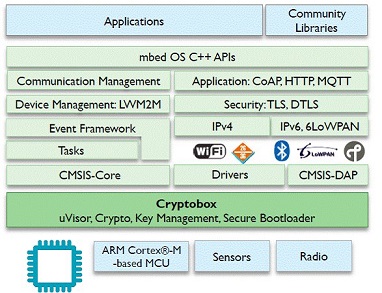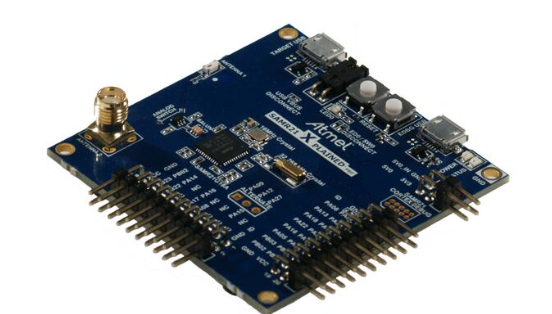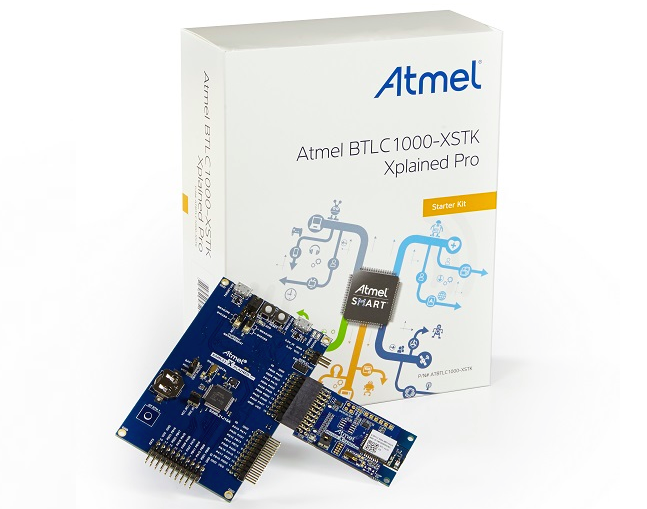Chipmakers like Atmel are joining hands with ARM to bring the entire ecosystem under one roof and thus facilitate the creation of standards-based IoT products.
ARM’s mbed operating system is winning attention in the highly fragmented embedded software space by promising a solid software foundation for interoperable hardware and thus scale the Internet of Things designs by narrowing the development time.
Atmel has put its weight behind ARM’s mbed OS by launching the single-chip evaluation board for the IoT ecosystem in a bid to ensure low software dependence for the embedded developers. The leading microcontroller supplier unveiled the mbed evaluation platform at the recent ARM TechCon held in Santa Clara, California.
The mbed OS platform is focused on rapid development of connected devices with an aim to create a serious professional platform to prototype IoT applications. So IoT developers don’t have to look to software guys for help. The mbed stack features a strong focus on enhancing the IoT’s connectivity and software components.

ARM is the lead maintainer for the mbed OS modules while it adds silicon partners, like Atmel, as platform-specific dependencies for the relevant mbed OS modules. Silicon partners are responsible for their platform-specific drivers.
Atmel’s mbed-enabled evaluation board is based on the low-power 2.4GHz wireless Cortex-M0+ SAM R21 MCU. Moreover, Atmel is expanding mbed OS support for its Wi-Fi modules and Bluetooth Low Energy products.
The fact that Atmel is adding mbed OS to its IoT ecosystem is an important nod for ARM’s mbed technology in its journey from merely a hardware abstraction layer to a full-fledged IoT platform. Atmel managers acknowledge that mbed technology adds diversity to embedded hardware devices and makes MCUs more capable.
Solid Software Foundation
There is a lot of code involved in the IoT applications and software is getting more complex. It encompasses, for instance, sensor library to acquire data, authentication at IoT gateways and SSL security. Here, the automatic software integration engine like mbed lets developers focus on their applications instead of worrying about integrating off-the-shelf software.
The mbed reference designs like the one showcased by Atmel during ARM TechCon are aimed at narrowing the development time with the availability of building blocks and design resources—components, code and infrastructure—needed to bootstrap a working IoT system. Atmel managers are confident that a quality software foundation like mbed could help bring IoT products to market faster.

Atmel’s mbed-enabled IoT evaluation board promises harmony between hardware and software. Apparently, chipmakers like Atmel are joining hands with ARM to bring the entire ecosystem — OS software, cloud services and developer tools — under one roof, and thus facilitate the creation of standards-based IoT products. Atmel’s mbed evaluation board clearly mirrors that effort to deliver a complete hardware, software and developer tools ecosystem in order to bring IoT designs quicker to market.
The platform comprises of mbed OS software for IoT client devices like gateways and mbed Device Server for the cloud services. ARM launched the mbed software platform in 2014 and Atmel has been part of this initiative since then.
mbed in Communications Stack
Additionally, Atmel has tied the mbed association to its SmartConnect wireless solutions to make the best of mbed’s networking stack in the Internet of connected things. The IoT technology is built on layers, and here, interoperability of communications protocols is a key challenge.
For a start, Atmel’s SAM R21-Xpro evaluation board is embed-enabled and is built around the R21 microcontroller, which has been designed for industrial and consumer wireless applications running proprietary communication stacks or IEEE 802.15.4-compliant solutions.
Next up, the evaluation board includes SAM W25 Wi-Fi module that integrates IEEE 802.11 b/g/n IoT network controller with the existing MCU solution, SAM D21, which is also based on the Cortex-M0+ processor core.

Furthermore, Atmel is offering an mbed-enabled Bluetooth starter kit that includes SAM L21 microcontroller-based evaluation board and ultra-low-power Bluetooth chip BTLC1000, which is compliant with Bluetooth Low Energy 4.1. Atmel demonstrated a home lighting system at the ARM TechCon show floor, which employed SAM R21-based Thread routers that passed light sensor information to an mbed-enabled home gateway. Subsequently, this information was processed and sent to the mbed Device Server using a web interface.
Majeed Ahmad is the author of books Smartphone: Mobile Revolution at the Crossroads of Communications, Computing and Consumer Electronics and The Next Web of 50 Billion Devices: Mobile Internet’s Past, Present and Future.



